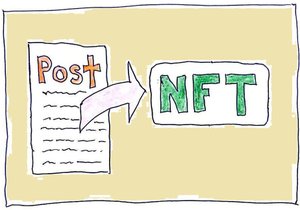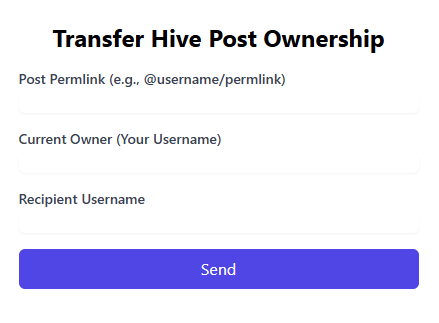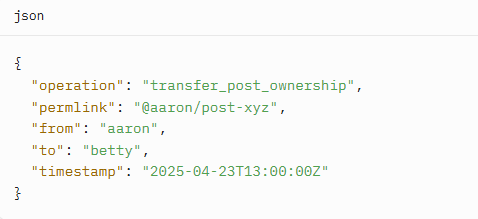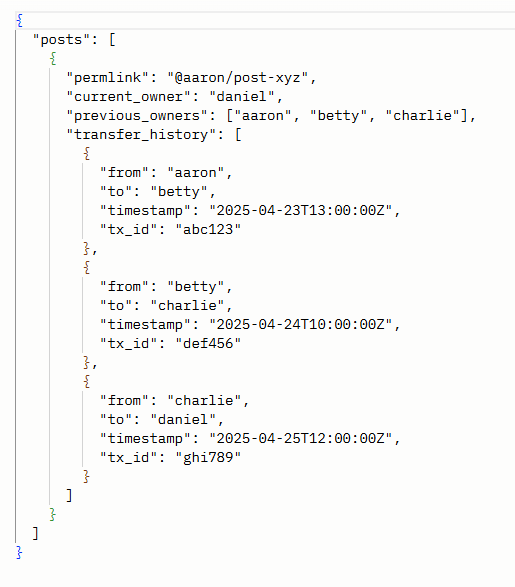crrdlx on Nostr: Hive posts as NFTs, revisited ...
Hive posts as NFTs, revisited

A couple of days ago, I heard about Zora.co for the first time. Apparently, Zora is a protocol of some sort that uses Ethereum and/or the Base blockchain. I understand very little of this, but it's a social network where users can "mint" any post into "coins." That is, users other than the author can mint them into coins, I think. Those user-minters own shares in that minted coin, effectively as an NFT which can then be transferred if desired. The post's author earns royalties in perpetuity on any transfers. (I could be wrong on any or all of this.)
The concept reminded me of [CoinTelegraph when they did this](https://cointelegraph.com/news/cointelegraph-historical-collection-is-live-mint-the-biggest-crypto-news-stories-now) a couple of years ago. Every article they wrote could be minted into an NFT and purchased. I don't think they still do this, but [I thought it was brilliant](https://hive.blog/leofinance/@crrdlx/the-brilliance-of-turning-everything-you-make-digitally-into-nfts) when they did...if it doesn't sell, then it doesn't sell. If it does sell, well, you just made extra income.
Thinking about NFTs at that time, I'd fleshed out [my own definition](https://peakd.com/nfts/@crrdlx/nfts-defined-in-three-words) back in 2021: I wrote that NFTs are "verified, unique, ownership."
- **verified** - You can look on the immutable blockchain to verify everything. A better word might have been "provenance."
- **unique** - You can look at the immutable metadata to see that it's different from any other token. The image may be the same, but it's different.
- **ownership** - You can verify which wallet owns this unique NFT. (The idea of "ownership" is fascinating. I'm enraptured by Chapter 89 of *Moby Dick*, which they evidently still study in law schools...who owns the whale?)
Then thinking further a year later, I pondered whether a [Hive post could be considered an NFT itself](https://peakd.com/hive/@crrdlx/hive-posts-as-nfts). This was somewhat like the CoinTelegraph articles as NFTs except that Hive articles innately may contain each quality of an NFT. Witness: every Hive post is...
- verified - The Hive chain is immutable and transparent for review by anyone.
- unique - Each Hive post has a unique identifier, just see the URL of any post.
- ownership - This is where it gets a little in the weeds. It stands to figure that a Hive post is "owned" by the author, the creator. But the question then becomes, "How can I transfer this ownership?"
I did a little AI chatbot chatting prior to writing this. I had the chatbot review my earlier Hive posts about NFTs above. It liked my definition, had a couple of nit-picky points, but essentially agreed that my verified, unique, ownership was correct. With ownership, it spoke a lot about transferability, and even suggested "ownership" be dropped for transferability. Maybe that's an improvment, but that sounds like semantics only...transferability is just ownership by another's name, isn't it? Aaron owned it, then transferred it to Betty, and now Betty owns it. The point is that the current owner can be verified on the blockchain.
In my Hive-Post-as-NFT post, I wrote about how Hive posts might be able to be transferred. In sum...
- I could simply state it manually in writing on chain: "I hereby transfer ownership of post XYZ from me to Betty. Betty now owns post XYZ."
- I pondered that a front end UX might be developed one day to facilitate this.
## Transfer?
So, now, I wonder what might be required to facilitate the "transferability" of a Hive post? I imagine (1) a front end. We typically think of a marketplace for NFTs, but it doesn't need to be. It could be nothing more than a form: enter username of owner, enter username of person to receive ownership. A standardized custom json might do well to format the data so it can be used. (2) A decentralized, immutable database that houses the past owners and particularly the current owner of the NFT. (3a) A back end to process the transfer. This could be a web page to parse the custom json and show it in a neat fashion. Or, (3b) This could be a smart contract that would handle things; see below.
Step 3b brings up a problem. The back end would either have to be a script running on a centralized server (not ideal), or a smart contract (which is how "regular" NFTs work on chains like Ethereum). But, Hive cannot run smart contracts. Maybe an L2 would work, or, the Virtual Smart Chain (VSC) is trying to bring smart contracts to Hive and seems promising. It's a baby currently, though, VSC would be months or years down the road.
### Manual transfer method
For now, let's consider the somewhat manual method of a transfer from Aaron to Betty where Aaron posts, "Hey, Betty now owns post XYZ."
I'm thinking the manual method might look like this:
1. Aaron goes to a front end with a form for post unique identifier, owner (by default, the author is the initial owner), user to receive ownership.
2. Aaron enters the info (including Betty's username), pushes a "send" button.
3. A database (not sure where) records replaces "owner" from Aaron to Betty. Aaron's name could be listed under "previous owners".
4. The database would be publicly accessible.
This method is crude, but it would work for verified, unique, ownership.
### Smart contract transfer method
I'm thinking the smart contract method might look like this:
1. Aaron goes to a front end with a form for post unique identifier, owner (by default, the author is the initial owner), price to sell (Aaron enters a price he's willing to sell ownership for, say 3 HIVE), royalty % (say 10% is default), expiration date. (If Aaron wanted to simply transfer the post ownership to Betty, he could just do like the "manual method", enter Betty's username, and hit "send" like above.) In this case though, does not enter a transfer username. He's simply putting it up for sale at a price he's willing to sell it for. He hits "put it up for sale".
2. Ownership of the post then transfers to the smart contract. Let's name the smart contract "Smarty." The smart contract logs the information on the database, with owner now listed as "Smarty" and "Aaron" listed as previous owner. The we wait.
3. The smart contract is waiting for one of two things to happen: either someone pays the 3 HIVE for ownership, or the expiration date comes. If the "expiration date" comes without a purchase, then ownership reverts back to Aaron and the database is updated accordingly. Or, if Charlie buys ownership, the smart contract updates the database (which is a transfer of ownership) and sends a message to both Aaron and Charlie.
4. When Charlie made the purchase, Smarty the smart contract did three things: routed the 3 HIVE to Aaron, updated the database, and notified them both.
5. Suppose Charlie, current owner, puts the NFT/ownership up for sale for 5 HIVE. Ownership is recorded as "Smarty", Charlie is recorded as a "previous owner" (maybe a category for "seller" would be appropriate, but it doesn't matter). Suppose Daniel wants to buy it, and indeed does.
6. Smarty routes the 5 HIVE, updates the database (owner "Daniel", previous owner "Charlie"), sends notifications. But, back to the 5 HIVE, 10% (0.5 HIVE) is routed to Aaron as the original author and only 4.5 HIVE is sent to Charlie. Aaron, as original author, will get 10% forever as royalty.
## How the manual method might work
Smart contracts are not here on Hive yet. So, let's go back to the manual method to imagine how that might look.
##### Front end
A simple form is set up.

Entering the info and sending generates a custom json.

##### Database
And it's recorded.

Next, suppose Betty transfers ownership to Charlie. Then, Charlie transfers it to Daniel. The ownership database would look like this now (of course, this is .json fashion; it could be made pretty on a web page).

I think all of this is doable, right now, on Hive.
## Why?
The big question is, "Why would anyone even want to own a Hive post?"
This question is both futile to ask and impossible to answer. Why does anyone buy anything? Some things are bought because they have value in their utility: a hammer, a Philly cheesesteak and beer. Some things are bought with no seeming utility or value to anyone, *except to the person who bought it*. Do we really need to offer examples of head-scratching purchases by people?
Why would someone buy a Hive post, or at least want to own a Hive post, I don't know. But, it's possible.
----
<center> )
)
<sub>I go by @crrdlx or "CR" for short. See all my links or contact info at https://linktr.ee/crrdlx.
</sub></center>
---
Originally posted on Hive at https://hive.blog/@crrdlx/hive-posts-as-nfts-revisited
Cross-posted using [Hostr](https://github.com/crrdlx/hostr), version 0.0.1

A couple of days ago, I heard about Zora.co for the first time. Apparently, Zora is a protocol of some sort that uses Ethereum and/or the Base blockchain. I understand very little of this, but it's a social network where users can "mint" any post into "coins." That is, users other than the author can mint them into coins, I think. Those user-minters own shares in that minted coin, effectively as an NFT which can then be transferred if desired. The post's author earns royalties in perpetuity on any transfers. (I could be wrong on any or all of this.)
The concept reminded me of [CoinTelegraph when they did this](https://cointelegraph.com/news/cointelegraph-historical-collection-is-live-mint-the-biggest-crypto-news-stories-now) a couple of years ago. Every article they wrote could be minted into an NFT and purchased. I don't think they still do this, but [I thought it was brilliant](https://hive.blog/leofinance/@crrdlx/the-brilliance-of-turning-everything-you-make-digitally-into-nfts) when they did...if it doesn't sell, then it doesn't sell. If it does sell, well, you just made extra income.
Thinking about NFTs at that time, I'd fleshed out [my own definition](https://peakd.com/nfts/@crrdlx/nfts-defined-in-three-words) back in 2021: I wrote that NFTs are "verified, unique, ownership."
- **verified** - You can look on the immutable blockchain to verify everything. A better word might have been "provenance."
- **unique** - You can look at the immutable metadata to see that it's different from any other token. The image may be the same, but it's different.
- **ownership** - You can verify which wallet owns this unique NFT. (The idea of "ownership" is fascinating. I'm enraptured by Chapter 89 of *Moby Dick*, which they evidently still study in law schools...who owns the whale?)
Then thinking further a year later, I pondered whether a [Hive post could be considered an NFT itself](https://peakd.com/hive/@crrdlx/hive-posts-as-nfts). This was somewhat like the CoinTelegraph articles as NFTs except that Hive articles innately may contain each quality of an NFT. Witness: every Hive post is...
- verified - The Hive chain is immutable and transparent for review by anyone.
- unique - Each Hive post has a unique identifier, just see the URL of any post.
- ownership - This is where it gets a little in the weeds. It stands to figure that a Hive post is "owned" by the author, the creator. But the question then becomes, "How can I transfer this ownership?"
I did a little AI chatbot chatting prior to writing this. I had the chatbot review my earlier Hive posts about NFTs above. It liked my definition, had a couple of nit-picky points, but essentially agreed that my verified, unique, ownership was correct. With ownership, it spoke a lot about transferability, and even suggested "ownership" be dropped for transferability. Maybe that's an improvment, but that sounds like semantics only...transferability is just ownership by another's name, isn't it? Aaron owned it, then transferred it to Betty, and now Betty owns it. The point is that the current owner can be verified on the blockchain.
In my Hive-Post-as-NFT post, I wrote about how Hive posts might be able to be transferred. In sum...
- I could simply state it manually in writing on chain: "I hereby transfer ownership of post XYZ from me to Betty. Betty now owns post XYZ."
- I pondered that a front end UX might be developed one day to facilitate this.
## Transfer?
So, now, I wonder what might be required to facilitate the "transferability" of a Hive post? I imagine (1) a front end. We typically think of a marketplace for NFTs, but it doesn't need to be. It could be nothing more than a form: enter username of owner, enter username of person to receive ownership. A standardized custom json might do well to format the data so it can be used. (2) A decentralized, immutable database that houses the past owners and particularly the current owner of the NFT. (3a) A back end to process the transfer. This could be a web page to parse the custom json and show it in a neat fashion. Or, (3b) This could be a smart contract that would handle things; see below.
Step 3b brings up a problem. The back end would either have to be a script running on a centralized server (not ideal), or a smart contract (which is how "regular" NFTs work on chains like Ethereum). But, Hive cannot run smart contracts. Maybe an L2 would work, or, the Virtual Smart Chain (VSC) is trying to bring smart contracts to Hive and seems promising. It's a baby currently, though, VSC would be months or years down the road.
### Manual transfer method
For now, let's consider the somewhat manual method of a transfer from Aaron to Betty where Aaron posts, "Hey, Betty now owns post XYZ."
I'm thinking the manual method might look like this:
1. Aaron goes to a front end with a form for post unique identifier, owner (by default, the author is the initial owner), user to receive ownership.
2. Aaron enters the info (including Betty's username), pushes a "send" button.
3. A database (not sure where) records replaces "owner" from Aaron to Betty. Aaron's name could be listed under "previous owners".
4. The database would be publicly accessible.
This method is crude, but it would work for verified, unique, ownership.
### Smart contract transfer method
I'm thinking the smart contract method might look like this:
1. Aaron goes to a front end with a form for post unique identifier, owner (by default, the author is the initial owner), price to sell (Aaron enters a price he's willing to sell ownership for, say 3 HIVE), royalty % (say 10% is default), expiration date. (If Aaron wanted to simply transfer the post ownership to Betty, he could just do like the "manual method", enter Betty's username, and hit "send" like above.) In this case though, does not enter a transfer username. He's simply putting it up for sale at a price he's willing to sell it for. He hits "put it up for sale".
2. Ownership of the post then transfers to the smart contract. Let's name the smart contract "Smarty." The smart contract logs the information on the database, with owner now listed as "Smarty" and "Aaron" listed as previous owner. The we wait.
3. The smart contract is waiting for one of two things to happen: either someone pays the 3 HIVE for ownership, or the expiration date comes. If the "expiration date" comes without a purchase, then ownership reverts back to Aaron and the database is updated accordingly. Or, if Charlie buys ownership, the smart contract updates the database (which is a transfer of ownership) and sends a message to both Aaron and Charlie.
4. When Charlie made the purchase, Smarty the smart contract did three things: routed the 3 HIVE to Aaron, updated the database, and notified them both.
5. Suppose Charlie, current owner, puts the NFT/ownership up for sale for 5 HIVE. Ownership is recorded as "Smarty", Charlie is recorded as a "previous owner" (maybe a category for "seller" would be appropriate, but it doesn't matter). Suppose Daniel wants to buy it, and indeed does.
6. Smarty routes the 5 HIVE, updates the database (owner "Daniel", previous owner "Charlie"), sends notifications. But, back to the 5 HIVE, 10% (0.5 HIVE) is routed to Aaron as the original author and only 4.5 HIVE is sent to Charlie. Aaron, as original author, will get 10% forever as royalty.
## How the manual method might work
Smart contracts are not here on Hive yet. So, let's go back to the manual method to imagine how that might look.
##### Front end
A simple form is set up.

Entering the info and sending generates a custom json.

##### Database
And it's recorded.

Next, suppose Betty transfers ownership to Charlie. Then, Charlie transfers it to Daniel. The ownership database would look like this now (of course, this is .json fashion; it could be made pretty on a web page).

I think all of this is doable, right now, on Hive.
## Why?
The big question is, "Why would anyone even want to own a Hive post?"
This question is both futile to ask and impossible to answer. Why does anyone buy anything? Some things are bought because they have value in their utility: a hammer, a Philly cheesesteak and beer. Some things are bought with no seeming utility or value to anyone, *except to the person who bought it*. Do we really need to offer examples of head-scratching purchases by people?
Why would someone buy a Hive post, or at least want to own a Hive post, I don't know. But, it's possible.
----
<center> )
)<sub>I go by @crrdlx or "CR" for short. See all my links or contact info at https://linktr.ee/crrdlx.
</sub></center>
---
Originally posted on Hive at https://hive.blog/@crrdlx/hive-posts-as-nfts-revisited
Cross-posted using [Hostr](https://github.com/crrdlx/hostr), version 0.0.1
